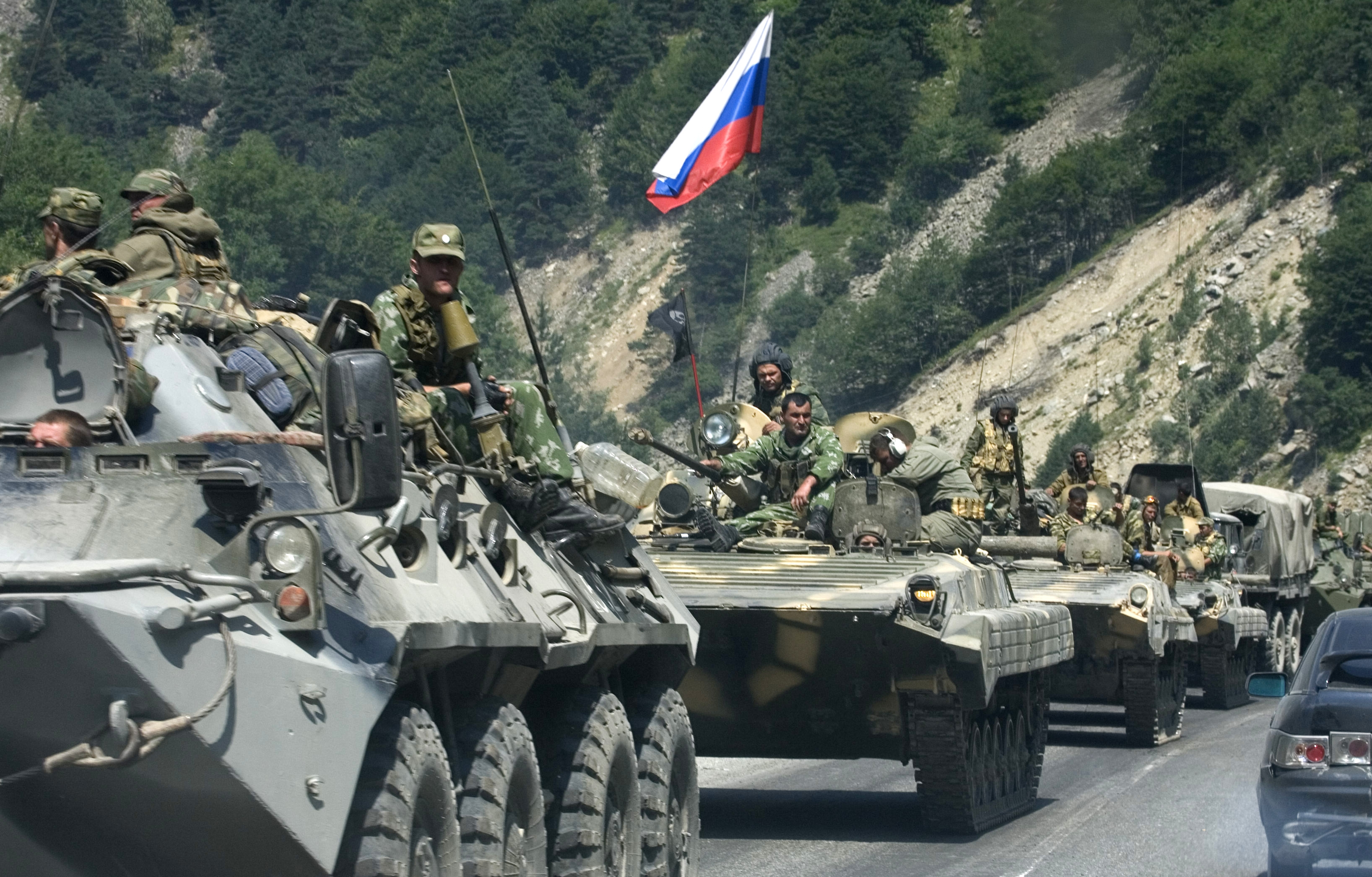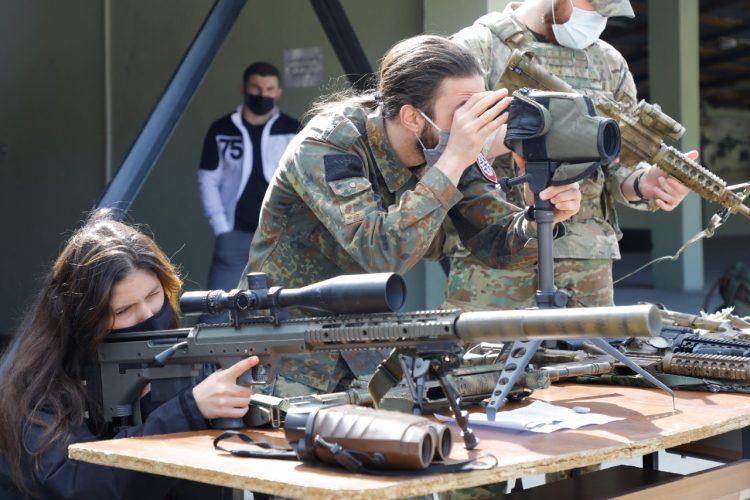
ECHR publishes judgment in Georgia v. Russia case on August War 2008
21/01/2021 10:49:20 Foreign Politics
The Strasbourg-based European Court of Human Rights (ECHR) delivered on Thursday its judgment in the inter-State case of Georgia v. Russia (II) concerning the August War 2008.
"The Court considered that in the event of military operations carried out during an international armed conflict, it was not possible to speak of “effective control” over an area. The very reality of armed confrontation and fighting between enemy military forces seeking to establish control over an area in a context of chaos meant that there was no control over that area. This was also true in the present case, as the majority of the fighting had taken place in areas previously under Georgian control.
The Court therefore attached decisive weight to the fact that the very reality of armed confrontation and fighting between enemy military forces seeking to establish control over an area in a context of chaos not only meant that there was no “effective control” over that area, but also excluded any form of “State agent authority and control” over individuals. It thus considered that the conditions it had applied in its case-law to determine the exercise of extraterritorial jurisdiction by a State had not been met in respect of the military operations it was required to examine in the present case concerning the active phase of hostilities in the context of an international armed conflict. That did not mean that States could act outside any legal framework; in such a context, they were obliged to comply with the very detailed rules of international humanitarian law.
The Court concluded that the events occurring during the active phase of hostilities (8 to 12 August 2008) had not fallen within the jurisdiction of the Russian Federation for the purposes of Article 1 of the Convention and declared this part of the application inadmissible.
The Court found that the Russian Federation had exercised “effective control”, within the meaning of its case-law (Loizidou v. Turkey, Cyprus v. Turkey, Ilaşcu and Others v. Moldova and Russia, Al-Skeini and Others v. the United Kingdom, and Catan and Others v. the Republic of Moldova and Russia), over South Ossetia, Abkhazia and the “buffer zone” during the period from 12 August to 10 October 2008, the date of the official withdrawal of the Russian troops. After that period, the strong Russian presence and the South Ossetian and Abkhazian authorities’ dependency on the Russian Federation indicated that there had been continued “effective control” over South Ossetia and Abkhazia.
The Court concluded that the events occurring after the cessation of hostilities(following the ceasefire of 12 August 2008) had fallen within the jurisdiction of the Russian Federation for the purposes of Article 1 of the Convention", the verdict says.
The Court found that "the Russian Federation had exercised “effective control”, within the meaning of its case-law (Loizidou v. Turkey, Cyprus v. Turkey, Ilaşcu and Others v. Moldova and Russia, Al-Skeini and Others v. the United Kingdom, and Catan and Others v. the Republic of Moldova and Russia), over South Ossetia, Abkhazia and the “buffer zone” during the period from 12 August to 10 October 2008, the date of the official withdrawal of the Russian troops. After that period, the strong Russian presence and the South Ossetian and Abkhazian authorities’ dependency on the Russian Federation indicated that there had been continued “effective control” over South Ossetia and Abkhazia."
The Court concluded that "the events occurring after the cessation of hostilities(following the ceasefire of 12 August 2008) had fallen within the jurisdiction of the Russian Federation for the purposes of Article 1 of the Convention."
"The Court observed that the information appearing in sourcesincluding reports by the EU Fact-Finding Mission, the OSCE, the Council of Europe Commissioner for Human Rights, Amnesty International and Human Rights Watch was consistent as regards the existence, after the cessation of active hostilities, of a systematic campaign of burning and looting of homes in Georgian villages in South Ossetia and the “buffer zone”. Such information was also consistent with satellite imagery from 9 October 2008 showing that the housesin question had been burnt. That campaign had been accompanied by abuses perpetrated against civilians, and in particular summary executions. Three Georgian witnesses heard by the Court had also mentioned burning and looting of houses by South Ossetian militias while their villages had been under Russian control, and abuses perpetrated against Georgian civilians.
The Court reiterated that an administrative practice was defined not only by a “repetition of acts”, but also by “official tolerance”: “illegal acts are tolerated in that the superiors of those immediately responsible, though cognisant of such acts, take no action to punish them or to prevent their repetition; or that a higher authority, in face of numerous allegations, manifests indifference by refusing any adequate investigation of their truth orfalsity, orthat in judicial proceedings a fair hearing of such complaints is denied”
Although some witness statements indicated that at times Russian troops had intervened to stop abuses being committed against civilians, in many cases Russian troops had been passively present during scenes of looting. Despite the order given to the Russian armed forcesto protect the population and carry out peacekeeping and law-enforcement operations on the ground, the measures taken by the Russian authorities had proved insufficient to prevent the alleged violations. This could be deemed to be “official tolerance” by the Russian authorities, as was also shown by the fact that the latter had not carried out effective investigations into the alleged violations. The Court held that it had sufficient evidence in its possession to enable it to conclude beyond reasonable doubt that there had been an administrative practice contrary to Articles 2 and 8 of the Convention and Article 1 of Protocol No. 1 asregardsthe killing of civilians and the torching and looting of housesin Georgian villagesin South Ossetia and the “bufferzone”. Having regard to the seriousness of the abuses committed, which could be classified as “inhuman and degrading treatment” owing to the feelings of anguish and distresssuffered by the victims – who had been targeted as an ethnic group – the Court found that this administrative practice had also been contrary to Article 3 of the Convention. The rule of exhaustion of domestic remedies did not apply where the existence of an administrative practice was established," the verdict says.
"There had therefore been a violation of Articles 2, 3 and 8 of the Convention and Article 1 of Protocol No. 1, and the Russian Federation was responsible for that violation," the ECHR added.
The Court noted that it was not disputed that 160 Georgian civilians, most of whom were fairly elderlyand one-third of whom were women, had been detained by South Ossetian forces in the basement ofthe “Ministry of Internal Affairs of South Ossetia” in Tskhinvali between around 10 and 27 August2008. Since the Georgian civilians had been detained mainly after the hostilities had ceased, the Courtconcluded that they had fallen within the jurisdiction of the Russian Federation.
"The Court concluded that there had been an administrative practice contrary to Article 3 as regardsthe conditions of detention of some 160 Georgian civilians and the humiliating acts to which they hadbeen exposed, which had caused them undeniable suffering and had to be regarded as inhuman anddegrading treatment. In accordance with the Court’s case-law, the rule of exhaustion of domesticremedies did not apply where the existence of an administrative practice was established.
There had therefore been a violation of Article 3 of the Convention, and the Russian Federation wasresponsible for that violation.
The Court concluded that there had been an administrative practice contrary to Article 5 as regardsthe arbitrary detention of Georgian civilians in August 2008, and that the Russian Federation wasresponsible for the resulting violation", the verdict says.
The Court observed that cases of ill-treatment and torture of prisoners of war by South Ossetian forceshad been mentioned in the various sources available to it. At the witness hearing in Strasbourg, twowitnesses had described in detail the treatment that had been inflicted on them by the South Ossetianand also the Russian forces.
"The Court found that the ill-treatment inflicted on the Georgian prisoners of war had to be regardedas acts of torture within the meaning of Article 3 of the Convention. Such acts were particularly seriousgiven that they had been perpetrated against prisoners of war, who enjoyed a special protected statusunder international humanitarian law.The Court concluded that there had been an administrative practice contrary to Article 3 of theConvention as regards the acts of torture of which the Georgian prisoners of war had been victims.There had therefore been a violation of Article 3, and the Russian Federation was responsible for thatviolation." the verdict says.
The ECHR said that "the information in the different sources available to the Court was consistent regarding the refusal ofthe South Ossetian and Abkhazian authorities to allow the return of many ethnic Georgians to theirrespective homes, even if some returns in the region of Akhalgori had been authorised. Negotiationswere under way in Geneva with a view to finding a political solution. In the meantime, the de factoSouth Ossetian and Abkhazian authorities, and the Russian Federation, which had effective control over those regions, had a duty under the Convention to enable inhabitants of Georgian origin to returnto their respective homes.":
"The situation regarding the inability of Georgian nationals to return to their respective homes had stillbeen ongoing on 23 May 2018, the date of the hearing on the merits in the present case.
There had therefore been a violation of Article 2 of Protocol No. 4 at least until 23 May 2018, and theRussian Federation was responsible for that violation".
"The Court considered that it did not have sufficient evidence in its possession to conclude beyondreasonable doubt that there had been incidents contrary to Article 2 of Protocol No. 1. There had therefore been no violation of that Article", the ECHR said.
The Court concluded that "the Russian Federation had had an obligation to carry out an adequate andeffective investigation not only into the events occurring after the cessation of hostilities, but also intothe events occurring during the active phase of the hostilities.Having regard to the seriousness of the crimes allegedly committed during the active phase of thehostilities, and the scale and nature of the violations found during the period of occupation, the Courtfound that the investigations carried out by the Russian authorities had notsatisfied the requirementsof Article 2 of the Convention.There had therefore been a violation of Article 2 of the Convention in its procedural aspect."
"In view of the above conclusions, the Court held that there was no need for a separate examinationof the applicant Government’s complaint under Article 13 in conjunction with Articles 3, 5 and 8 ofthe Convention and with Articles 1 and 2 of Protocol No. 1 and Article 2 of Protocol No. 4.", the verdict says.
"After examining the documents submitted to the Court at its request by the applicant Government,the Court found that the applicant Government had complied with their obligation to cooperate underArticle 38 of the Convention.The respondent Government had refused to submit “combat reports”, on the grounds that thedocuments in question constituted a “State secret”, despite the arrangements proposed by the Courtfor the submission of non-confidential extracts. Nor had they submitted any practical proposals to theCourt that would have allowed them to satisfy their obligation to cooperate while preserving thesecret nature of certain items of information. The Court therefore found that the respondentGovernment had fallen short of their obligation to furnish all necessary facilities to the Court in itstaskof establishing the facts of the case, as required under Article 38 of the Convention.", the ECHR said.
Georgia appealed ECHR on August 11, 2008, a day before the EU-mediated six-point ceasefire agreement was signed with Russia. The application was declared admissible and relinquished to the Grand Chamber on 3 April 2012.
Georgia accused Russia of violating eight articles of the European convention on human rights. It raises issues under Articles 2 (right to life), 3 (prohibition of torture, inhuman and degrading treatment), 5 (right to liberty and security), 8 (right to respect for private and family life), and 13 (right to an effective remedy) of the Convention, under Articles 1 and 2 of Protocol No. 1 (protection of property and right to education), as well as under Article 2 of Protocol No. 4 (freedom of movement). ECHR held the oral hearing into the case on May 23, 2018.
Georgia submitted about 700 credible pieces of evidence and materials to the court.









